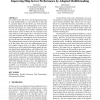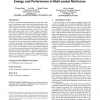28 search results - page 1 / 6 » Improving http-server performance by adapted multithreading |
PDCN
2004
13 years 5 months ago
2004
It is wellknown that http servers can be programmed easier by using multithreading, i.e. each connection is dealt with by a separate thread. It is also known, e.g. from massively ...
HPDC
2012
IEEE
11 years 6 months ago
2012
IEEE
Consider a multithreaded parallel application running inside a multicore virtual machine context that is itself hosted on a multi-socket multicore physical machine. How should the...
MSR
2005
ACM
13 years 9 months ago
2005
ACM
Software continually changes due to performance improvements, new requirements, bug fixes, and adaptation to a changing operational environment. Common changes include modificatio...
HPCA
1998
IEEE
13 years 8 months ago
1998
IEEE
This paper examines the performance benefits of employing multicast communication and application-level multithreading in the Brazos software distributed shared memory (DSM) syste...
GECCO
2009
Springer
13 years 2 months ago
2009
Springer
Simultaneous Multithreading (SMT) is a technology aimed at improving the throughput of the processor core by applying Instruction Level Parallelism (ILP) and Thread Level Parallel...


